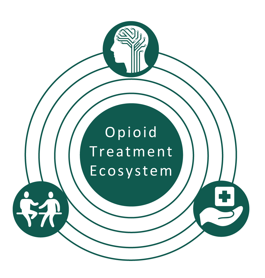Registration is open for 2024 New Commissioner School sessions in November-December
 The Michigan Association of Counties is again pleased to partner with Michigan State University Extension (MSUE) to present the New Commissioner School (NCS) courses in the weeks after the Nov. 5 General Election.
The Michigan Association of Counties is again pleased to partner with Michigan State University Extension (MSUE) to present the New Commissioner School (NCS) courses in the weeks after the Nov. 5 General Election.
Registration and online course content for the school is now available! This program has been preparing new and veteran commissioners since 1968. Participants will explore governance complexities, understand their roles, learn about county finance and develop strategies for effective decision-making and collaboration.
The 2024 NCS includes self-paced online modules or live webinars in November, followed by in-person workshops in December. Participants should plan to complete either the self-paced content or the live webinars AND attend one of the in-person workshops in order to receive their certificate of completion from MSU Extension and County Commissioner Academy credits from MAC.
The December live locations are:
- Dec. 2 – Bavarian Inn and Conference Center, One Covered Bridge Lane, Frankenmuth (to allow for onsite preparation registration closes Nov. 25)
- Dec. 3 – BayPointe Inn, 11456 Marsh Rd., Shelbyville (to allow for onsite preparation registration closes Nov. 25)
- Dec. 9 – Kirtland College, 4800 W. 4 Mile Rd., Grayling (to allow for onsite preparation registration closes Dec. 3)
- Dec. 10 – Bay College Escanaba, 2001 N. Lincoln Rd., Escanaba (to allow for onsite preparation registration closes Dec. 3)
For more information or to register, visit events.anr.msu.edu/ncs/.
Please contact MSU Extension Specialist Eric Walcott at walcott3@msu.edu with any questions.
Bill to expand options for opioid antagonists moves to Senate floor
 Legislation to expand the available options of opioid antagonists to local governments, non-profits, public safety departments and more was voted out of the Senate Committee on Health Policy this week.
Legislation to expand the available options of opioid antagonists to local governments, non-profits, public safety departments and more was voted out of the Senate Committee on Health Policy this week.
Senate Bill 542 , by Sen. Kevin Hertel (D-Macomb), would allow a government entity that received an opioid antagonist from the Michigan Department of Health and Human Services (MDHHS) at no cost to choose the formulation, type of delivery service, method of administration or dosage of the opioid antagonist. The ability to decide on formulation or dosage only applies if the formulation or dosage chosen would not result in a loss of Federal funding.
An opioid antagonist includes naloxone, or any “similar and equally safe” drug approved by the United States Food and Drug Administration for the treatment of drug overdose.
Currently, counties can utilize the MDHHS naloxone (an opioid antagonist) portal to access naloxone at no cost. SB 542 expands the type of opioid antagonist available to government entities through the MDHHS portal.
MAC supports SB 542 and efforts to expand resources to counties for reduction, treatment and prevention of the opioid epidemic.
For more information on this issue, contact Samantha Gibson at gibson@micounties.org.
Podcast 83: Commissioners can use issue briefs to help MAC staff in run-up to ‘lame duck’
 With legislative activity in Lansing still on a slow simmer, at best, MAC’s advocacy staff continue to prepare for what is expected to be an extraordinary “lame duck” session after the General Election, MAC’s Podcast 83 team explains in a new episode.
With legislative activity in Lansing still on a slow simmer, at best, MAC’s advocacy staff continue to prepare for what is expected to be an extraordinary “lame duck” session after the General Election, MAC’s Podcast 83 team explains in a new episode.
“First, there are the concerns around minimum staffing,” said Deena Bosworth. “Legislation in the House right now would make minimum staffing a mandatory subject of bargaining at the local level, particularly for Public Act 312 employees, and you combine that with the expansion of binding arbitration to corrections officers earlier this year, that’s highly concerning for us, and we will continue to oppose that going into lame duck.
“On the tax and finance side of things, we’re looking at perhaps tackling the ‘Dark Stores’ legislation,” Bosworth added. “Reps. (Julie) Brixie and (Jenn) Hill have some bills in and I know it’s a very big priority for them.
“And clearly the no. 1 issue is our Revenue Sharing Trust Fund again, which is sitting in the Senate Finance Committee; we are hoping that they move it out of there. We do know we have an overwhelming number of legislators in support of it. It’s just (a matter of) will they move it and put it on the governor’s desk for her signature?”
Bosworth also noted that MAC has released a series of one-page “Issue Briefs” for members to use in their talks with state legislators.
“We give them a little bit of background on the topic and really what we want you to talk to your legislators about,” Bosworth said. “So please, everybody … look up those issue briefs. If you are seeing your legislators back in district before the election … please bring some of these items up and help us get over the finish line on some of them.”
MAC Issue Briefs
Host and Executive Director Stephan Currie reviewed the results of MAC’s Annual Conference, held Sept. 24-26, including:
- The installation of Wayne County’s Melissa Daub as MAC’s 116th Board president
- The election of John Malnar of Delta County as the newest MAC Board director
View the full episode, recorded on Sept. 30, by clicking here.
Previous episodes can be seen at MAC’s YouTube Channel.
And you always can find details about Podcast 83 on the MAC website.
Senate committee reviews wrongful conviction legislation
 Michigan’s Wrongful Imprisonment Compensation Act (WICA) offers a wrongfully incarcerated person $50,000 for each year they were in prison. Upon dismissal of charges, or a retrial finding the individual not guilty, the wrongfully incarcerated person can file a WICA claim.
Michigan’s Wrongful Imprisonment Compensation Act (WICA) offers a wrongfully incarcerated person $50,000 for each year they were in prison. Upon dismissal of charges, or a retrial finding the individual not guilty, the wrongfully incarcerated person can file a WICA claim.
Senate Bill 997, by Sen. Stephanie Chang (D-Wayne), requires a prosecutor to respond within 60 days to participate in a suit regarding a WICA claim. While MAC supports the goal of ensuring wrongfully incarcerated individuals are made whole by the government, requiring already severely understaffed prosecutor’s offices to respond to claims within 60 days exacerbates overwhelming workloads. SB 997 would also increase court costs, and as the largest funding source for trial courts, counties cannot be subject to increased costs. MAC is working to require state funding to alleviate this financial burden.
Senate Bill 1014, by Sen. Jeff Irwin (D-Washtenaw), requires the storage of DNA evidence for the duration of an individual’s sentence, so that it can be retrieved in the event of a WICA claim or overturn of conviction. While such DNA is crucial in substantiating a wrongfully incarcerated person’s innocence, requiring local courts to store and retain the DNA for decades poses increased storage and labor costs.
MAC is working with bill sponsors to alleviate the unfunded mandates posed by SBs 997 and 1014. The bills await further testimony in the Senate Committee on Civil Rights, Judiciary and Public Safety.
For more information on this issue, contact Samantha Gibson at gibson@micounties.org.
Webinar to review medical transport effort in Michigan
 The U.S. Centers for Medicare and Medicaid Services (CMS) oversees the Ground Emergency Medical Transportation (GEMT) program. GEMT provides funding and support to eligible healthcare providers through state agencies, aiming to ensure that individuals without reliable transportation can access emergency medical care. This program improves access to emergency services for Medicaid beneficiaries, bridging the gap between patients and healthcare facilities and facilitating timely care during emergencies.
The U.S. Centers for Medicare and Medicaid Services (CMS) oversees the Ground Emergency Medical Transportation (GEMT) program. GEMT provides funding and support to eligible healthcare providers through state agencies, aiming to ensure that individuals without reliable transportation can access emergency medical care. This program improves access to emergency services for Medicaid beneficiaries, bridging the gap between patients and healthcare facilities and facilitating timely care during emergencies.
While Michigan doesn’t currently participate in the program, our state has the eighth-highest number of Medicaid enrollees in the nation. Local emergency services and ambulance providers are not fully reimbursed by Medicaid to cover the costs of medical transportation for this significant segment of our communities. The GEMT initiative in Michigan seeks to address health disparities, promote health equity, and reimburse local agencies and emergency services providers for serving vulnerable populations.
A $500,000 appropriation was secured in the FY25 state budget to assist MDHHS in starting up GEMT in Michigan. House Bill 5695, by Rep. Mike McFall (D-Oakland), requires MDHHS to participate in the federal GEMT reimbursement program and awaits movement in the House Insurance and Financial Services Committee.
The GEMT Webinar on Monday, Oct. 7 at 11 a.m. (Eastern) will review the status of HB 5695 and key next steps in moving this program forward. Topics for the one-hour session will include the anticipated schedule for legislation, provider cost reporting, committee testimony preparation and DHHS preparation committee.
For more information on this issue, contact Samantha Gibson at gibson@micounties.org.

 MAC on the Road: Tri-County Summit in Macomb County
MAC on the Road: Tri-County Summit in Macomb County
MAC Executive Director Stephan Currie and Governmental Affairs Director Deena Bosworth joined MAC President Melissa Daub (center), First Vice President Antoinette Wallace (second from right) and Board Director Sarah Lucido (second from left) at 2024 Tri-County Summit on Friday in Macomb County.
The summit, a gathering of leaders from Macomb, Oakland and Wayne counties, continued the theme of “Moving Forward. Moving Together” and focused on environmental issues such as disaster planning and climate change, as well as sustainability and regional transportation.
 Oct. 15 info event set for broadband funding
Oct. 15 info event set for broadband funding
Local governments and Internet Service Providers (ISPs) can connect and explore partnerships at a matchmaking event on Oct. 15. The Michigan High-Speed Internet office (MIHI) will be hosting “Building Bridges for BEAD” at the Crystal Mountain Resort in Thompsonville.
This is an opportunity for locals and ISPs that are interested in applying for Broadband Equity Access and Deployment (BEAD) funding to learn more about potential collaborations. Public and private partnerships will be paramount to the successful deployment of broadband infrastructure across Michigan.
The forum will be “a fast-paced, guided activity” to initiate conversations and allow for networking. To register or learn more, click here.
NACo again encourages veteran recognition with Operation Green Light
 America’s counties have a long and proud history of serving our nation’s veterans, a legacy that continues to this day as we work with our federal, state and local partners to ensure that the former service members have access to the resources they need to thrive.
America’s counties have a long and proud history of serving our nation’s veterans, a legacy that continues to this day as we work with our federal, state and local partners to ensure that the former service members have access to the resources they need to thrive.
Once again on Veterans Day, the National Association of Counties (NACo) and the National Association of County Veterans Service Officers (NACVSO) invite the nation’s 3,069 counties, parishes, and boroughs to join Operation Green Light and show support for veterans by lighting our buildings green from Nov. 4-11, 2024. By shining a green light, county governments and our residents will let veterans know that they are seen, appreciated and supported.
To show support, counties are encouraged to use this template to pass a resolution declaring your county’s participation in Operation Green Light.
Staff picks
- Could parks and beaches replace coal plants in Michigan? Bay City may find out (Bridge Michigan)
- Advancing inclusive development in rural towns (Brookings Institution)
- What counties should know about the Congressional Observer Program ahead of the November 2024 election (NACo County News)
- Michigan Lead Service Line Status (chart) (Michigan Senate Fiscal Agency)
